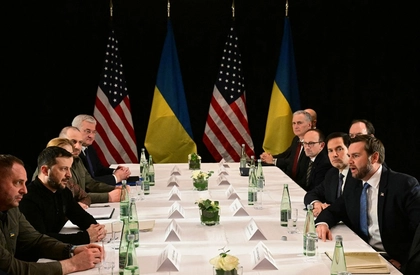Russian troops began to occupy Ukraine’s Kherson region – located in the south of Ukraine, bordering Crimea – on day one of the full-scale invasion. Now, almost the whole region is under occupation. According to the city council, the enemy killed 40 residents on Feb. 24 and has repeatedly captured heads of village and city councils who resisted cooperation with the occupying authorities. On June 28, the occupiers detained the mayor of Kherson, Ihor Kolykhayev.
Kyrylo Stremousov, a Russian collaborator and current deputy head of the military-civilian administration, said that Russia plans to hold a so-called referendum on the accession of the Kherson region to Russia in the fall. This claim has also been reported by British intelligence.
This action begs the following questions: Is it realistic for Russia to hold referendums now? What problems might it face? What are the possible consequences?
Could a referendum go ahead?
The Kherson region is currently a leader among areas with a partisan movement. Since the very beginning of the occupation, peaceful anti-occupation protest actions have been held repeatedly. The population collects data on the Russian military and, where possible, passes this on to the armed forces of Ukraine. Partisans also “hunt” the occupiers.
According to Ukrainian political scientist Oleksandr Solontai, Russia understands that, due to the resistance of the local population, it will be difficult to hold a referendum anytime soon. Firstly, the residents will not accept it, and secondly, they will ignore participation in the vote.

Munich and After: An Unprincipled Mess
“I think that the referendum won’t be held at all. Hostilities are currently escalating in the Kherson region. If Ukraine goes on the counteroffensive and recaptures the villages, the referendum will be impossible, because Russia must control the entire territory of the region, not just a part,” Solontai believes.
Georgian military expert Tornike Sharashenidze disagrees. In conversation with me, Sharashenidze gave the example of referendums in the occupied territories of Donetsk and Luhansk regions.
“Then, Russia also did not control the entire territory, but it managed to hold its pseudo-referendum. Russia wants to put a label on the territory – ‘it is ours’. And ‘if it is ours, then we must protect it.’ That is, they will falsify votes, allegedly rely on the will of the people, and in doing so justify their military actions”.
In general, this is precisely why, according to Sharashenidze, Russia wants to hold a referendum. It is clear that the world will not recognize the outcome, but the Russian population will continue to believe in the legitimacy of their state’s actions. In addition, the expert adds, Russian President Vladimir Putin hopes that, despite the non-recognition of the referendum by nations the world over, then those countries currently committed to helping Ukraine will grow tired of the war and begin to get used to the new normal.
“We can remember the occupation of Crimea. No one recognized the referendum, but to put it bluntly, the whole world did not think about Crimea. They didn’t care. Currently, Putin is counting on the same course of history with the Kherson region. And here, everything depends on Ukraine. ven if a referendum is held, it will not matter, since everything will be decided on the battlefield. As long as Ukraine fights, the world will support it. And I hope that Ukraine will fight to the end,” Sharashenidze believes.
What does the loss of Kherson mean for Ukraine?
Currently, the occupied Kherson region is an enclave on the right bank of the Dnipro – the river that divides Ukraine into the western “right bank” and, accordingly, the eastern “left bank”. Kherson is the only regional center occupied on the right bank.
The Kherson region was the bridgehead to Crimea. Now, transport communications have been cut off, grain has been blocked and food stolen. No expert has yet assessed the physical damage as a result of the occupation of this territory. There is also the psychological harm from the brutal occupation, which is almost impossible to quantify. One should bear in mind that Kherson is one of the largest regions of Ukraine at more than 28 thousand square kilometers.
At present, it is not known how events will unfold, because war is cruelly unpredictable. However, today there is more and more talk about a counteroffensive by the Ukrainian military. A few days ago, the Minister of Reintegration of the Temporarily Occupied Territories of Ukraine, Iryna Vereshchuk, called on residents of the occupied Kherson region to either leave or to prepare for powerful hostilities by seeking shelter, water and food. The first deputy chairman of the Kherson Regional Council, Yuriy Sobolevskyi, subsequently made the same appeal.
While Ukraine is getting new weapons, the nation maintains hope that, very soon, instead of sirens, the national anthem of Ukraine will be heard throughout the territory of the sovereign state with restoration of its pre-2014 borders.
You can also highlight the text and press Ctrl + Enter











